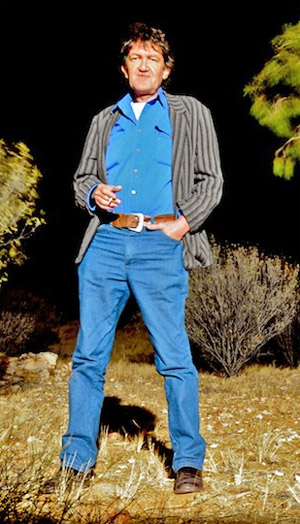In July 2011, my girlfriend and I travelled to Ukraine as guests of a dating website named Anastasia to report on one of their so-called romance tours. It was one of the strangest and coolest experiences of our lives.
What appears below is a longer version of a story that was published in the December 2011 issue of Maxim Australia. That story, entitled “European Union: Riding shotgun on a Ukrainian summer romance tour“, can be read here.
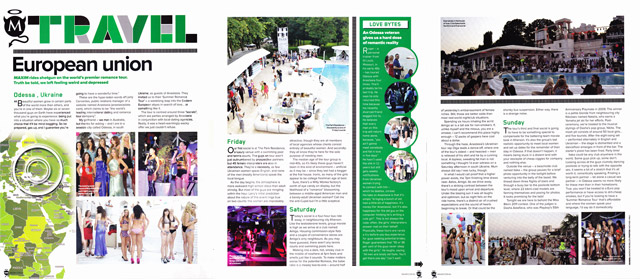
All words below were written by myself, Andrew McMillen. All photos below were taken by Rachael Hall; you can click any of them to view a larger version, which will open in a new window.
If you would like to republish this story or these photos, please contact me via email or Twitter.
++
In Search of Ukrainian Summer Romance: Inside Anastasia’s Odessa Odyssey
by Andrew McMillen
“This is a situation that very few men in the world have ever been in, to walk into a place where there’s no pretence about what everybody is there for.”
We’re in a seaside city called Odessa, in south Ukraine. More accurately, we’re in a stuffy basement conference room at the Continental Hotel in the city’s centre. We’re being addressed by Larry Cervantes, public relations manager of a website named Anastasia, which claims to be “the world’s leading international dating and romance tour company”. My girlfriend Rachael and I are here as guests of Anastasia to report on their Ukrainian ‘summer romance tour’.
“Beautiful women grow in certain parts of the world more than others,” Larry continues, “and you’re in one of them. Maybe six or seven thousand guys in the world have experienced what you’re going to experience: being put into a situation where you have so much choice that it’ll be mind-boggling. So be prepared, gas up, and I guarantee you’re going to have a wonderful time.”
One seasoned summer romance tourist adds, “Plan to do this a lot in the future!”, and two dozen men join him in laughter.
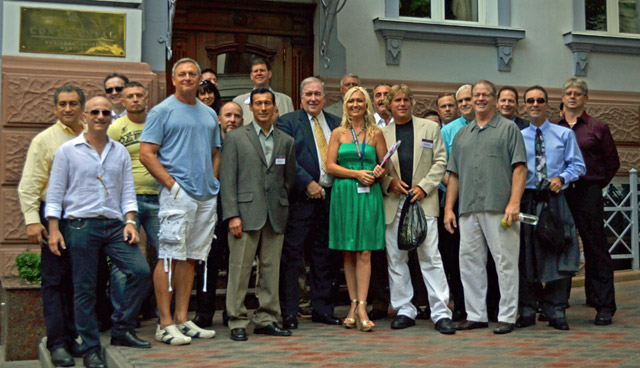
Larry is impressively tanned, speaks in a deep, low Californian drawl, and offered us a forceful handshake at Odessa Airport yesterday afternoon. Odessa is a strange, beautiful city; in the midst of summer, the air crackles with a dry, insistent heat that’s a pleasant change from the humidity of Brisbane. It’s home to one of the largest ports in the Black Sea basin, yet as our taxi driver threads his way through traffic sans seatbelt while yelling into his mobile phone we get the distinct impression that most buildings outside of the tourist-friendly city centre are slowly falling apart from decades of neglect.
Larry tells us that 45 men have signed on for this tour; a statement which seems strange, as over the next seven days we follow the tour, we never see more than 30 at any one time. One can only assume that their reasons for attending lie somewhere on the spectrum between searching for casual sex and lifelong commitment. Whatever the case, they’re each prepared to spend US$5,000 – including return airfares from New York’s JFK airport and local accommodation – to be here. The median age of the mostly-American tour group sits between 40 and 45. There’s one Australian: Owen, a West Australian miner in his early 40s. Most of the men are educated professionals. Many of them have at least one divorce under their belt.
The walls of the basement conference room feature tasteful oil paintings of the London Bridge and World Trade Centre. Four Anastasia reps are seated at the front of the room: Larry, William Tate – an affable American tour representative who served in the United States Marines – and two Ukrainian representatives named Olga and Anna. Before they address us, the mood is somewhat standoffish. Some of the 24 men chat quietly amongst themselves; most sit alone, eyes to the front, wondering silently what they’ve gotten themselves into. None of them give off the impression of being pick-up artists, or Neil Strauss acolytes. Just like in any high school classroom, the back row is full, but the first couple are sparse.
Eight media types line the aisle, ourselves included. Two comically large TV cameras – one from Australian 60 Minutes, the other from Sky News – scan the room. Their footage will undoubtedly be edited down to include only the most forlorn facial expressions. Over the next hour, the four Anastasia reps give their charges a rough ‘n’ ready guide to the Wild West that is Ukrainian dating. Most of the men have some familiarity with local members of Anastasia, having thoroughly combed the ladies’ profiles in search of their ideal match. Some have already set up dates through the website while they’re in town.
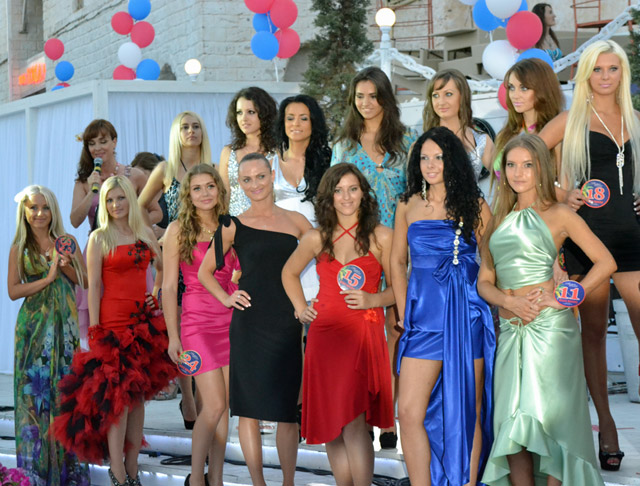
The company reps explore the concept of scamming – or, as euphemistically dubbed by William, “getting sushi’d” – at length. This is an apparently common situation during these kinds of tours, where a foreign man may unwittingly find himself footing the bill for an entire table’s drinks, entrees, steak, sushi; in the parlance of the overwhelmingly American entourage, ’the whole nine yards’. Local custom deigns that men invariably take care of most monetary concerns, and some of the women they’ll meet in the next week will try to exploit this to their advantage. ”You don’t want to appear cheap, or miserly,” explains Larry, “but you don’t want to appear to be foolish with money.”
Based on the witty quips a couple of the men toss in throughout the hour, it’s apparent that they’re return visitors to this region. Their knowledge sets them apart as the group’s worldly alpha males, and they seem only too happy to inhabit this role. A pair sat toward the back snigger conspiratorially over a laptop. The younger, shaggy-haired surfer-type, Derek, shows his white-haired pal Roger a photograph of a European-looking lady lying on what appears to be a hotel bed, dressed only in lingerie.
++
The next day, on the bus ride to the first social, I meet a portly, genial German in his early 30s named Edward. He’s a return visitor to Anastasia’s Ukraine tours, but claims to be here more out of boredom – he had a week off from his job in Frankfurt – than any real desire to meet local women. It sounds like he’s hedging his bets in anticipation of failure. He tells me that most of these guys won’t get laid on this trip, let alone find long-term partners. “If you’re looking for a fuck trip, you should go to Germany,” he advises me via a thick accent. He politely declines my offer of a more formal interview later in the week.

We arrive at The Park Residence [pictured above], a luxury country club-style venue built featuring a central swimming pool and adjacent tennis courts. Anastasia’s photographer and videographer circle the group, madly recording away as the men stroll through a car park. It’s hot; many of the guys are dressed to impress in dark suits, which must be uncomfortable. They all head for the poolside bar, while a house music soundtrack – managed by a bored-looking dude in his 20s – washes over a crowd of women. The vast majority of them are young and stunning. So begins the group’s first six hours of socialising, Odessa-style.
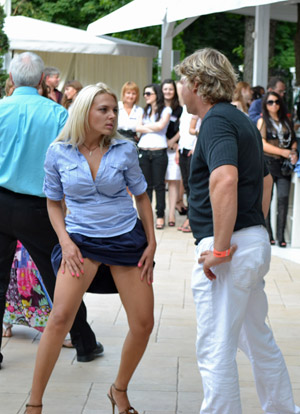
The men here aren’t only outnumbered by women – perhaps four-to-one at the party’s peak – but female interpreters, too: 45 of them have been commissioned for this event alone, which means that there’s always a few extras lounging around in the shade and picking at fruit platters. Some of the tourists appear to use the trip as an excuse to become new men; performers whose egos float far, far higher than their everyday persona. Others remain trapped by their insecurities and self-esteem issues. They may be in a different country, but it’s hard to forget everything they’ve learned in their life when it comes to women, and the attraction thereof.
Though initially the mood at The Park is more high-school disco than adult social, owing to the awkwardness and segregation between the sexes, most of the guys are mingling within the hour. Larry’s initial prediction about the nature of this event rings true on two counts: the women are improbably attractive, though to be fair, they’re all members of local agencies whose clients consist entirely of beautiful women. And secondly: they all know that they’re here for the sole purpose of meeting men. Given the median age of the tour group, it’s likely that these guys won’t have been in this kind of environment – as artificial as it may be – since college keggers. Which is ironic, as many of these girls would appear to be college freshmen at best. There’s eye candy on display, sure, but when it comes to the likelihood of a middle-aged man finding both physical and intellectual stimulation in a barely-adult woman, it’s easy to slip into scepticism.
In the late afternoon, tour host Olga MCs a poolside dance-off that’s narrated entirely in Ukrainian, for the benefit of the local women. Derek is paired with a lustrous blonde, who he later tells us is a stripper. Tour guide William Owen – the West Australian miner, who is being closely filmed by 60 Minutes – and an American attorney named James battle it out over a few rounds. James is incredible shape for a 53 year-old: he pops, locks and swings his partner around like a hula hoop. He’s also a spitting image of a younger Sean Connery. Derek’s shirt is soon removed and he engages in some crude arse-grabbing and breast-motorboating with his partner [pictured below]. As far as gentlemanly conduct is concerned, he and James are oceans apart, yet together they’re the tour’s most extroverted characters. So ends the first of three socials, yet several of the men keep the party going elsewhere by arranging impromptu dates immediately afterwards. Others collect phone numbers with a view to set up dates in a few days’ time.
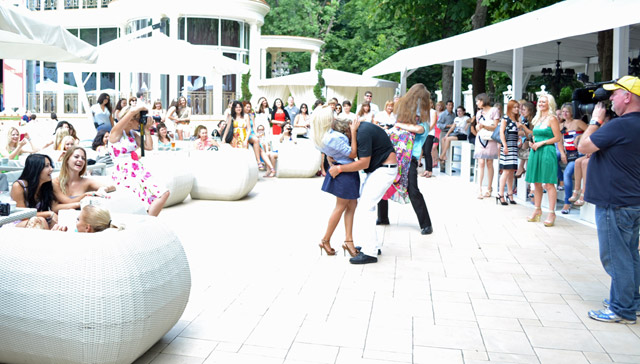
++
Saturday’s event – in neighbouring city Kherson – is a four-hour bus ride away. The roads in south Ukraine seem to be populated with vehicles driven by sociopaths. The asphalt is falling apart; indicators are rarely used; seatbelts are never used; and no-one is willing to show the slightest compassion for their fellow drivers. It’s vehicular madness, and it’s utterly fascinating. Tour rep William notices our interest and tells us that, for Ukrainian drivers, road signs and speed limits are considered “suggestive”, not prescriptive. He’s lived here on-and-off for six years, and believes that if you have “$100 and a face”, you’ll be given a driver’s license. He replaces the brakes and tyres on his BMW yearly due to the wear and tear caused by the poor road surface. “You’ve never experienced tailgating until you’ve driven here,” he tells us. “If you can fit a credit card between your car and theirs, that’s plenty of room.”
Luckily we brought three buses on the trip to Kherson, as one breaks down halfway there; its passengers join ours. At the back of the bus, Derek reveals to the group that he met his “smoking hot” Russian ex-wife of five years on a flight from Vienna to New York immediately after an Anastasia tour, not on the tour itself. She recently left him, soon after he’d put her through medical school. Curious. Group morale is high as we pass through the city of Kherson and arrive at a club named Amigo [pictured below]. Its location is anything but central; housing commission-style flats and a couple of convenience stores are Amigo’s only neighbours.
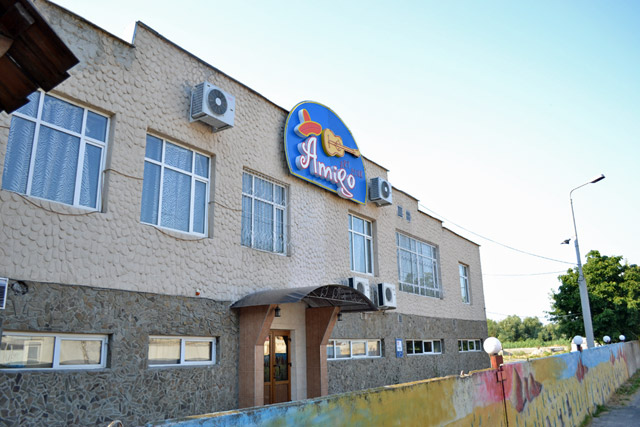
Walking off a bus at 1pm and upstairs into a dark, hot, smoky club feels as dirty as it sounds. We’re late – the bus driver took a few wrong turns – so most of the club’s seats are already occupied by women, who sip drinks and judge every man in eyeshot. If The Park’s circumstance felt questionably artificial, this feels outright plastic. To make matters worse for the guys, the ratio today is more like 2:1. Which still betters most real-world nightclub situations, but it’s a disappointment after the quantity of women in attendance yesterday. To be fair, Kherson is home to only a third of Odessa’s million-strong population.
Spending six hours breathing in Amigo’s poisonous atmosphere is a tall ask for non-smokers like us – though, incidentally, the tour’s smokers are thrilled to discover that 12-packs here cost the equivalent of AUD$1. The strangest thing about this club is that it’s attached to a bowling alley. Apparently Ukrainians are crazy about tenpin bowling, and not in an ironic manner. To break up the monotony of watching men dance awkwardly with women half their age, Rachael and I hire a lane for an hour and throw down.

Halfway through our second round, Olga announces another dance-off. Predictably, Derek and James reappear; the former loses his shirt again, while today James is paired with a chesty 20 year-old in a green dress who appears to be having the time of her life. Alarmingly, one of the tour’s oldest – and heaviest – men is relieved of his shirt and tie by a cunning local. A topless, sweating fat man is not something I thought I’d ever witness on a Saturday afternoon in south Ukraine. 7pm rolls around, mercifully, and then it’s adios, Amigo.
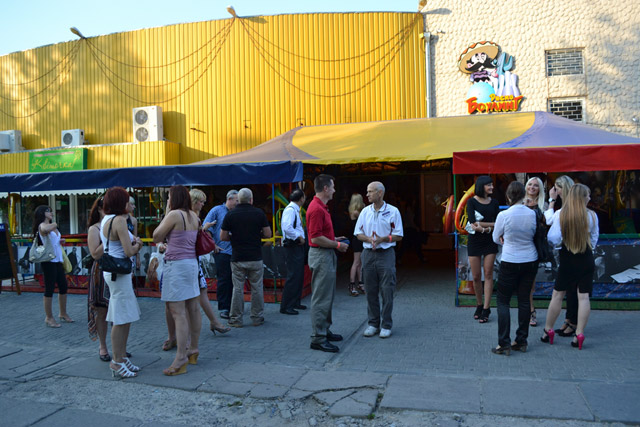
There’s a striking contrast between the tour’s mood upon arrival and departure. Under the blazing sun it was all laughs and optimism; as night descends on the ride home, it’s more funereal, with a dash of crushed expectations. No-one really knows what to say. Many of the tourists opt to stare out the window, lost in thought. To complicate matters and unintentionally rub salt in the group’s wounds, one Canadian guy has picked up a woman and is bringing her back to Odessa. Other than Rachael, she’s the only female on board. James is practically beside himself with incredulity. “How did this happen?” he asks the smug dude and his date, who both appear to be in their mid-30s. “You only met today, and you’re bringing her home?”
Moments before we left the venue, Derek gave a silver dress to a woman he’d met here years ago, yet within minutes of the gift-giving she left him drunk, shirtless and dejected. As our bus begins the long trek back to Odessa, Roger won’t stop giving him shit about it. “What happened with your gal? She didn’t like the dress?” Derek says she fed him a story about having to leave due to a sick mother – which makes sense, he says, as last time they met, she bailed on him to take care of her sick father. Roger laughs like a hyena. Derek, nonplussed, passes out flat on his back, blocking the aisle with his feet. His accomplice, too, has been drinking, and he deems now an appropriate time to share his perspective on these tours.
Roger – a personal trainer from St Louis, Missouri in his early 40s – has toured Odessa with Anastasia four times. He’s the relatively introverted yin to Derek’s relentlessly provocative yang. “I come for the party; for the kick of it,” he says. This’ll probably be his last trip. “The only reason I did it this time was because whine-bag back there” – he points his thumb at his recently-divorced friend Derek – “begged me to.” In his mind, he can either spend “$5,000 to go to Florida and lay on a beach for 10 days”, or the same amount of money to do the same thing here. He’s sceptical about the long-term prospects of any relationships formed here. ”I’m not saying that guys don’t find girls, because I’ve brought two back to the States.” Neither worked out for him; one was an interpreter who was simultaneously courting both him and another guy in Texas, unbeknownst to either of them. She used Roger for the airfare to St Louis, then fled south. It was a crushing disappointment at the time, but an experience he can laugh about now.
He believes that every man on this trip will return home alone. “You ain’t gonna meet somebody and fall in love in five days.” Roger says hasn’t used the website in 11 years, but still gets weekly email notifications from the site that Ukrainian women are allegedly “trying to connect with him” – which he deletes, unread. His take on Anastasia is that it’s simply “bringing a bunch of old men a little bit of happiness. It’s money for [Anastasia], but it’s also happiness for the old guy on the computer thinking he’s writing a cute girl.” Which is not always the case: often, the girls’ interpreters answer their mail on their behalf, he says. These tours are rarely a try-before-you-buy scenario for guys seeking potential brides; Roger says he “guarantees that 95 or 96% of the guys never sleep with the girls.” He laughs and tells me that “all men are lonely old fools. You’ll get there one day.”
We pull into a petrol station for a break, which rouses Derek from his slumber. He hasn’t eaten all day, yet he selects a Stella Artois for sustenance, returns to the bus, and starts drunk-dialling every woman in his phone. Which is amusing for a while, until I realise I’m speeding through the dark Ukrainian countryside, listening to a grown man acting like a desperate and dateless teenager. It’s a dark thought, and I try to shake it immediately, but it’s stuck. If the tour’s most experienced and extroverted guy is striking out, what chance do the rest of these dudes have? My mind is filled with despair for the plight of the summer romance tour. It’s nearly midnight when we return to Odessa. The Kherson trip has been a failure, and everyone knows it – except for the Canadian guy and his date, perhaps.
The tour’s third and final social takes place on Sunday evening, and it’s going to have to be something special to recoup the team morale lost in Kherson. It’s also the guys’ last realistic opportunity to meet local women and set up dates for the remaining five days. After this, they’re essentially on their own, which is a tough place to be in an unfamiliar country. Stakes are high.
++
On Sunday afternoon, we’re ushered into the same room used for orientation on Friday morning. Again the mood of the room tilts toward tension, as an overweight, greying Anastasia media rep named Walter Bodkin treats the 24 guys in attendance like naughty schoolchildren by, essentially, warning them to behave themselves tonight as there’ll be “loads of media there”. Upon our arrival in Ukraine, Larry spoke in awed tones of Walter’s presence on this trip: his 35 years of experience at US television network CBS lends heft to his professional capabilities. On Friday, Rachael and I spent nearly an hour listening to his tales and theories regarding international dating. Walter has been married twice; his most recent divorce cost him over $1 million – which he didn’t tell us, but I later discovered online.
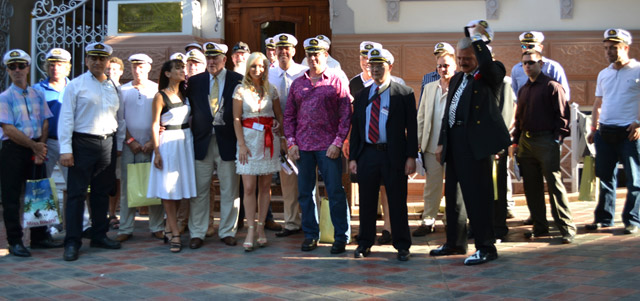
Ostensibly, a lot is riding on this final social for Anastasia in PR terms, and they don’t want the guys to mess it up. Tonight’s centrepiece is the Miss Bikini 2011 contest, which, frankly, the Anastasia staff seem more excited about than the tourists. Walter takes an ominous tone when advising the group that “once the local guys hear that there’s a bikini show on, they’re gonna want to get inside”, and that security will be tight. Yet, walking down Odessa’s main shopping strip a few days ago, we came across several large billboards advertising all three Anastasia socials in Ukrainian. To publicly advertise what’s being portrayed – by Walter, to the tourists – as a secret event seems deceptive. Olga presents each man with an Anastasia-branded gift bag containing a white sailor cap, which the guys are asked to wear before disembarking from the bus and strolling down the main strip of the popular Arcadia Beach. It’s corny as hell, but most of them comply.
The footpath to the social venue – a beachside club named Itaka – is congested with human traffic heading in the opposite direction to our group. Someone comments on this, and Walter laughs as he tells us that “they” – Anastasia, presumably – have cleared the beach ahead of our arrival. Which sounds like it’d take considerable cash and muscle to pull off, as there are hundreds of shirtless, suntanned locals streaming past us and throwing dirty looks. It’s impressive, to some extent, that they’d do that just for a couple of dozen guys, but also questionable considering that all these people were, until a few moments ago, doing their best to snatch some sunny Sunday joy amid a challenging day-to-day life. As in any other tourism-reliant city around the world, cash is king.
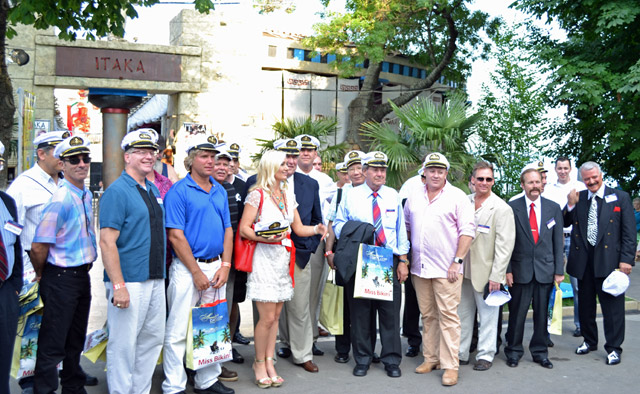
The group pauses for a brief photo opportunity outside the club [above], and then we venture into the belly of the beast. We’re led down three flights of stairs and through a busy bar to the bottom level, where 22 bikini-clad models are fanning themselves and posing for photos. Like Friday’s social, it’s centred around a swimming pool; like on Friday, security are actively discouraging patrons from diving in. Opposite the impromptu stage is the ocean, which shimmers as the sun starts to dip. The cordoned-off section of water at the foot of Itaka’s real estate is eerily sparse for such an idyllic location, until I remember the fleeing crowds. Now, dozens of empty plastic sun lounges face the Black Sea [pictured below]. A stray cat paws at the sand in search of salty snacks. House music – a fixture in this part of the world, it seems – thumps soullessly from the speakers as final preparations are made for Miss Bikini 2011.
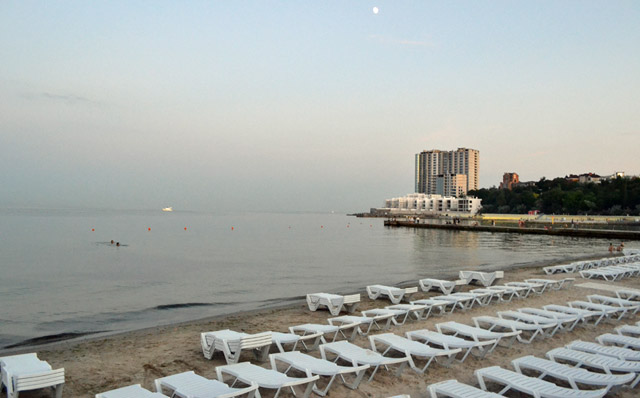
The tour group has been led into this surreal scene and left to fend for themselves. There’s a lot of standing around and gawking at the bikini girls. The wiser members of the tour fan out and begin introducing themselves to women seated poolside, interpreters in tow. The smartest guys ignore the bikini contest altogether and relocate to a second, smaller pool area to court women away from the glare and noise. The West Australian miner Owen – who, incidentally, is attending this tour for free as a guest of Anastasia – is judging the contest; so too is Walter, a British journalist from Loaded magazine, and a woman named Dasha Astafieva, who was Playboy’s 55th anniversary Playmate in January 2009.
Larry MCs the event in English; a female offsider does the same in Ukrainian. He introduces Dasha with an air of reverence, as if she discovered penicillin. Interestingly, scores of local women queue for photos with the porn star between breaks in her judging duties. Here, she has far more female fans than males, but that could also be because there are far more women in attendance. I’m watching the fawning group from behind [pictured below], when an overzealous admirer suddenly clutches her too hard and Dasha’s left breast momentarily slips out of her strapless dress. The crowd of surrounding women gasp in amazement as she quickly fixes herself, embarrassed. I’m convinced that I’m the only male in attendance who saw this happen.
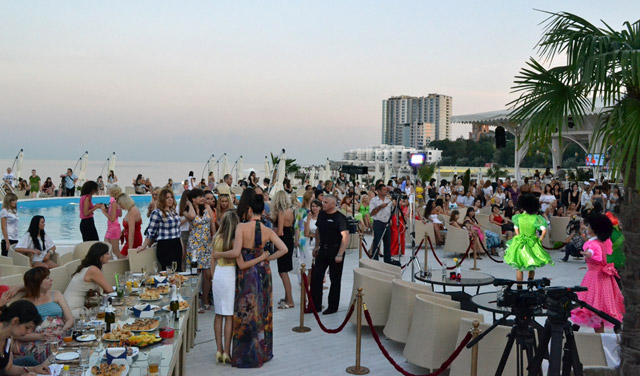
We meet another Australian named Chris. He is dressed in a blue singlet, jeans, work boots, trucker cap and sunglasses, and sports ponytailed grey hair and a foot-long grey beard. He wields an explosive laugh and speaks in the broadest Australian accent imaginable. Within our first five minutes of conversation, he reveals himself to be a xenophobe and a climate change sceptic. It’s fascinating to meet an archetypal bogan in a place like this. Naturally, 60 Minutes sink their claws into him immediately, and he’s plainly thrilled by the idea of appearing on national television while holidaying in Ukraine. This is his first trip outside of Australia. He’s only paid to attend this one social; the rest of his trip was self-arranged, including his apartment on the outskirts of Odessa. I’m impressed, because organising something of this scale seems far beyond his abilities. [Pictured below, left to right: 60 Minutes reporter Michael Usher, Chris, and myself.]
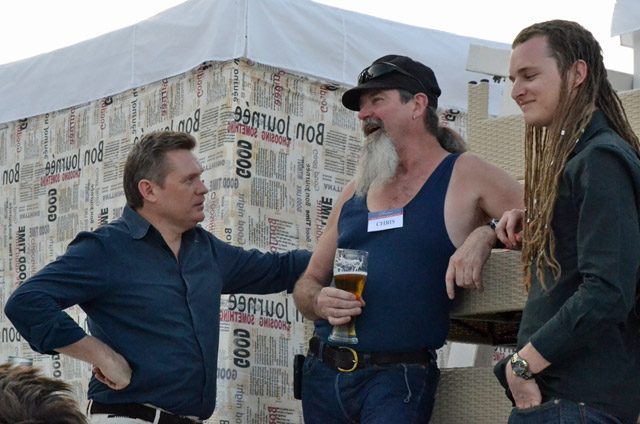
The bikini contest is won by a petite blonde from neighbouring city Nikolaev named Natalia, who earns a Yamaha jetski for her trouble. Dasha then leads a performance by her pop group, Nikita [pictured below], which features another female vocalist, backup dancers, and a shirtless male DJ who does little more than press ‘play’ and show off choreographed dance moves. There’s around 50 girls in the audience. I can only see five guys from the tour in the throng. After their eight-song set – performed alternately in English and Ukrainian – the stage is broken down and a dance floor opens up in front of the bar.
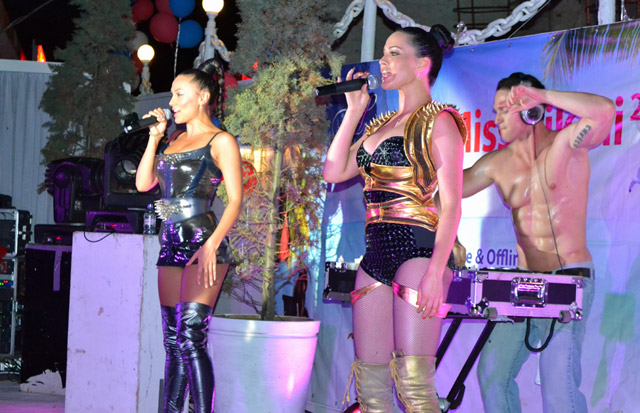
By this point, Itaka could be any club anywhere in the world. Some guys pick up; some don’t. Chris hits the beer pretty hard; he’s tanked before midnight, and asks an Anastasia rep to arrange a taxi home, alone. Looking across the crowds dancing poolside or conversing with the opposite sex, it does seem quite a stretch that this is all worth it, romantically speaking. In terms of meeting new people and having new experiences – sure. Just by signing up to this thing, it’s impossible for the guys not to tick both boxes. But finding a long-term partner – let alone a casual sex partner – in Odessa seems no more likely for these men than in their hometowns, were they actively pursuing either outcome.
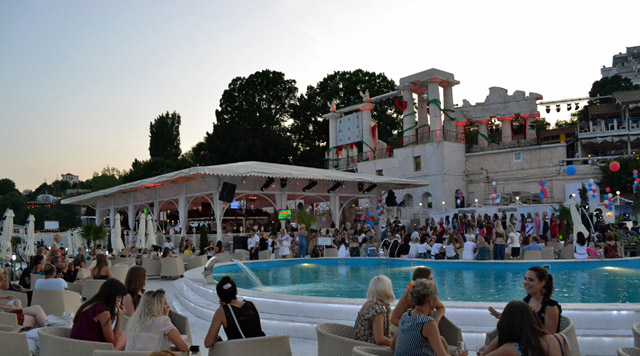
++
With the three socials over, the rest of the week is left fairly open. Daily sightseeing tours run to nearby venues like a winery and the Odessa catacombs. They’re sparsely-attended, but interesting and worthwhile for Rachael and I; less so for the single tourists, it seems, though a couple of guys bring dates and interpreters. From an Irish bar on the main strip on Tuesday night, we spy three of the tour guys walking alongside a tall, leggy blonde. ”So many hoops to jump through to probably not get laid,” remarks the American journalist we’re drinking with.

We get to talking with a couple of the other guys about their impressions of this trip. Lee [pictured in foreground, above], 43, owns a small trucking company in western Pennsylvania. “I’ve been married three times before,” he says. “No regrets. I never wanted to be divorced once; never thought it would happen three times.” He’s been a member of Anastasia since January 2011. This is his first trip outside of the US. He’s been on several dates and is particularly keen on two women: one in Odessa, who we’ve seen him with on several occasions and seems lovely, and another in Nikolaev who has been having problems finding a babysitter for her young child in order to meet Lee again. He doesn’t think dating here is any easier than back home. “If everything was easy, why would I need to come to Odessa? If it was easy I could walk down to the local pub, and – there she is.” He advises those intending to join a tour like this to “not set your expectations so high that they’re unattainable, because then you’re going to be disappointed”, and “just be yourself. I’ve been myself since the day I landed.” It seems to be working well for him.
Like Lee, James – the 53 year-old attorney, stunning dancer, and Sean Connery lookalike – wears his heart on his sleeve. They’re both totally sincere, and make no bones about their intentions here: to find their respective soulmates. “Most of these men are here for that reason,” James believes. “We’re not looking for a good time for a week. We’ve had that back home. We’re looking for somebody we can share our life with, but we have to be attracted to them as well, on every level. Do you really think we’d come all this way if we could find it at home? We can’t!” He first visited Odessa in May 2011, and says he did everything he was told not to do – “except wander off by myself. I didn’t do that. But – did I take them shopping? Yes. Did I fail to attend the socials in full? Yes. Women took me elsewhere; they took me out of the competition. I bought girls a pair of shoes, a purse, a cell phone, a laptop… it was about a $2,000 lesson, in total. Painful, but necessary.” He wasn’t self-aware last time, but believes he is now. He’s been on several dates, and he’d been corresponding with almost all of them through Anastasia beforehand. “I genuinely want to find the person who can love me the way I want to love them,” he says. “That’s what my parents had for 59 years. I’ve seen it. It exists.”
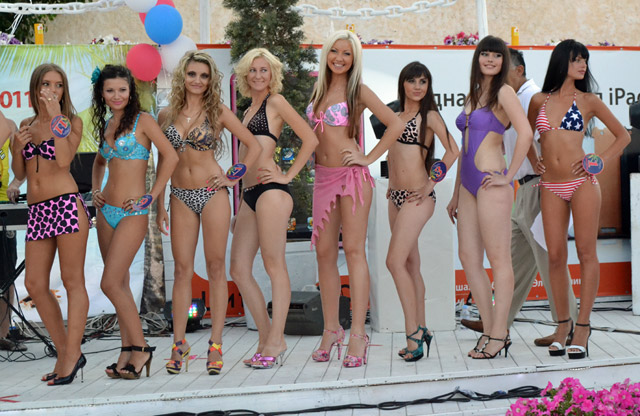
Word spreads among the group that Roger got sushi’d big-time earlier that night; his date and interpreter took him to the tune of US$900. We also hear that the oldest guy on the tour, Richie, yesterday proposed to a local girl. We catch up with him on our final night in Odessa, and he lays it all out on the table during a two-hour conversation. Like many elderly people, he goes to great pains to describe the smallest, most insignificant details of his stories, as if to justify his continuing existence. He tells us of his three failed marriages; his six children; his careers in construction, firefighting and police investigation, and everything in between. He tells us of meeting his new fiancée, Tanya, through Anastasia in March, after dreaming of a woman who looked exactly like her and combing the website for nearly a year.
“I flew 7,000 miles – a third of the way around the world – to meet the most gorgeous woman I’ve ever met in my life,” Richie says. “She’s beautiful inside and out. Every word she said on the computer, she’s proven beyond any reasonable doubt that she is the person that she claimed to be. I love her dearly. We’re hoping that we can get her visa and passport through as quickly as possible. We’re both very excited. We both want it to happen,” he says of his intention to take her back to his home in the United States. “I’m ecstatic. I can’t even begin to tell you how much I love her. Our biggest argument is who loves whom more. If our whole life goes that way, it’ll be the best argument the world has ever seen!”
At 29, Tanya is 39 years Richie’s junior. She doesn’t speak English; he doesn’t speak Ukrainian. I suspect deep down he knows the odds are against him. But what is love if not an insane leap at happiness? As we shake hands and say goodbye, I wish Richie all the best, and mean it more than I have in my whole life.
Andrew McMillen (@Andrew_McMillen) is an Australian freelance journalist.
For a girl raised in Alaska, traditional gender stereotypes tended to be trumped by practicality. Jewellery, make-up and flashy clothing are much less important than staying warm or, say, learning how to quickly change a car tyre during a nine-month winter. It’s a harsh environment that demands self-reliance and resilience from its inhabitants. So it was for Vivica Genaux, one of the world’s leading mezzosopranos, who spent her first 17 years living in a log cabin in a valley outside the town of Fairbanks.
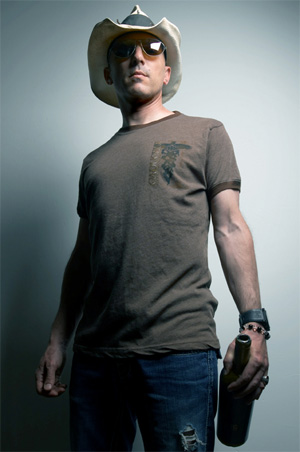 Don’t ask about Tool. Don’t ask about A Perfect Circle. Definitely don’t ask when Tool’s next album – their first since 2006’s 10,000 Days – is due. These are the publicist-stated rules of engagement when interviewing Maynard James Keenan, frontman of those two bands and also Puscifer, a “multimedia project” that encompasses music, film, performance, wine and clothing, and has released two albums so far: 2007’s V Is For Vagina and 2011’s Conditions Of My Parole. Keenan is touring the Puscifer show outside of North America for the first time in February 2013, with three Australian theatre shows booked around his commitments with A Perfect Circle at Soundwave Festival.
Don’t ask about Tool. Don’t ask about A Perfect Circle. Definitely don’t ask when Tool’s next album – their first since 2006’s 10,000 Days – is due. These are the publicist-stated rules of engagement when interviewing Maynard James Keenan, frontman of those two bands and also Puscifer, a “multimedia project” that encompasses music, film, performance, wine and clothing, and has released two albums so far: 2007’s V Is For Vagina and 2011’s Conditions Of My Parole. Keenan is touring the Puscifer show outside of North America for the first time in February 2013, with three Australian theatre shows booked around his commitments with A Perfect Circle at Soundwave Festival.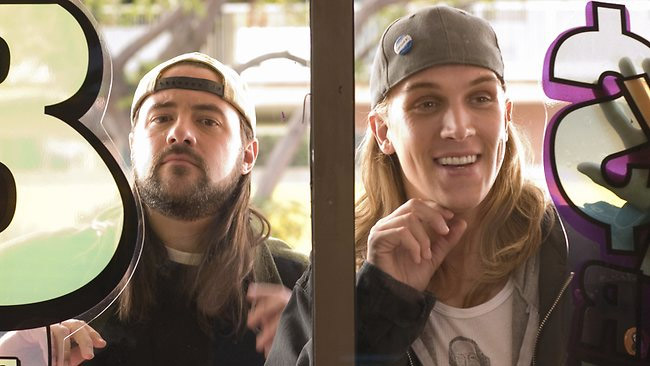
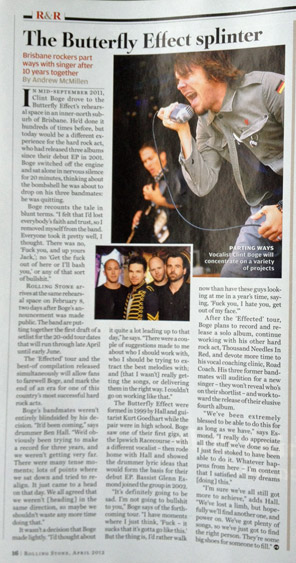
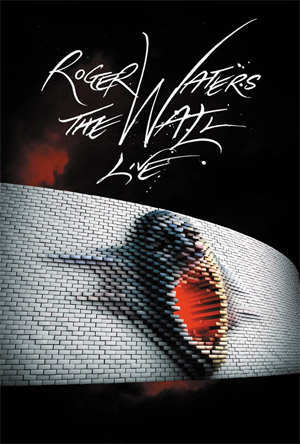
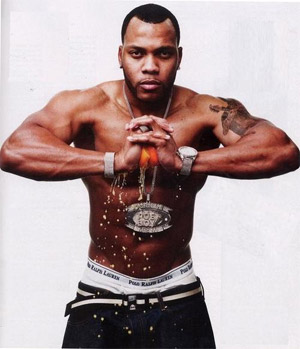 An eleventh hour cancellation is every live music promoter’s worst nightmare. Last week, we
An eleventh hour cancellation is every live music promoter’s worst nightmare. Last week, we 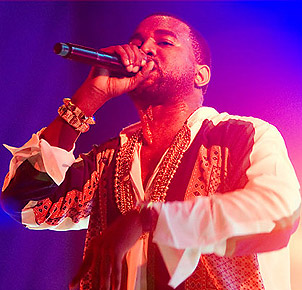
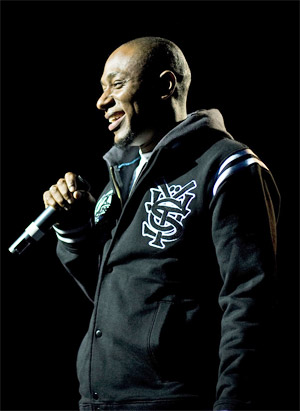 One year ago, acclaimed American hip-hop artist Dante Smith – stage name Mos Def (pictured right) – was set to tour Australia for the first time. Eleven shows were booked, including headline festival appearances at Soundscape in Hobart and The Hot Barbeque in Melbourne. After failing to appear at his first scheduled performance in Adelaide, he went on to randomly skip four shows of the itinerary. Such was the ensuing confusion, that following the postponements, cancellations and sternly-worded press releases from the promoter, Peace Music, became something of a sport here at TheVine. For background, revisit our news story
One year ago, acclaimed American hip-hop artist Dante Smith – stage name Mos Def (pictured right) – was set to tour Australia for the first time. Eleven shows were booked, including headline festival appearances at Soundscape in Hobart and The Hot Barbeque in Melbourne. After failing to appear at his first scheduled performance in Adelaide, he went on to randomly skip four shows of the itinerary. Such was the ensuing confusion, that following the postponements, cancellations and sternly-worded press releases from the promoter, Peace Music, became something of a sport here at TheVine. For background, revisit our news story 


















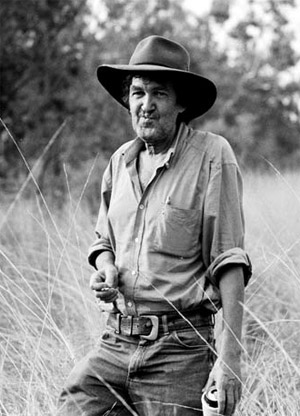 Hi Andrew,
Hi Andrew,